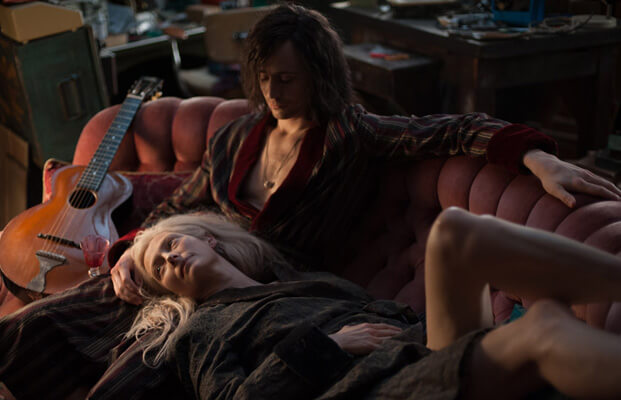Harold Pinter’s “Betrayal,” now in a spare and thought-provoking revival on Broadway, is not about mere adultery. If it were, it would be just another play about selfish, venal people seeking extramarital sex for thrill, variety, ego-boosting, or whatever reason. And, indeed, selfish and venal certainly describe the three characters: Jerry, the literary agent who has been carrying on a seven-year affair with Emma, who runs an art gallery and is married to Robert, a publisher and Jerry’s best friend.
But what makes the play interesting and highly relevant today is that despite the sex, marriage, friendship, and the seeming connections among these three in this dark triangle, they are each alone. Yes, they interact, but their behavior is never free of the constraints defined by their relationships with the other two. They are haunted by social structures, rules, and stress. The betrayal in the play is not only what the characters do to one another but in a larger, meta sense the way in which the accepted norms of marriage and friendship — designed to curtail human urges like lust and competition — run afoul of our natures and are inherently unworkable. That conflict, in Pinter’s construct, is irresolvable, and what should lead to pleasure and gratification instead leads to unhappiness and isolation.
In previous productions of this play — including the most recent Broadway outing in 2013 starring Daniel Craig — it has seemed more soap opera than existential meditation. Director Jamie Lloyd, abetted wonderfully by designer Soutra Gilmour, has placed the action in a featureless, but elegant void. It is almost completely monochromatic, a wall spans the width of the stage, and props are just chairs and a folding table. Turntables move characters in and out of focus, and all three characters are onstage nearly the entire time. The effect is expressionistic, conveying the level of emotional tension that thrums beneath the surface.
The story of Emma and Jerry’s affair is told in reverse, beginning in 1977, two years after their affair has ended. They have returned to chilly, formulaic interactions of asking about one another’s families. It’s clear that neither of them got what they wanted. In a series of scenes stretching back to 1968, we see the highpoint as well as the dissolution of the affair. What becomes intriguing is how each of the characters is trapped and betrayed by conditioning that makes fulfillment elusive, if not impossible. That’s the gnawing tragedy of this piece.
Under Lloyd’s direction, the cast is outstanding. True to Pinter, the play often happens between the words, and that requires a level of focus and intention unique to this genre that each actor masters to harrowing affect. Tom Hiddleston as Robert is the model of British propriety and reserve, until he isn’t. Zawe Ashton is excellent as Emma, restless and lost throughout.
Charlie Cox as Jerry plays him as the least troubled of the three with abundant charm. It’s easy to see why Emma would yield to a kiss at a party, when Jerry is drunk, not fully knowing the damage that would ensue.
This being a smart play about smart people, there’s some literate dialogue as well. In Yeats’ poem “Under Ben Bulben” about the futility and frustrations of life and art in the face of his own inevitable mortality, he writes, “Cast a cold eye/ On life, on death.” It’s a trenchantly chilly observation that’s very appropriate to this cool production.
Infidelity also sets the story going in “Fern Hill,” Michael Tucker’s bittersweet comedy at 59E59, though it is much more outspoken and obvious than anything Pinter every wrote. Three couples have gathered at the farm of Sunny and Jer. They are devoted friends in their 60s and 70s, considering turning the farm into a commune where they can all live together and care for one another as they age.
There is real affection and a bond among them all, evidently developed over many years. Billy, an aging rocker, and Michiko, a teacher, are ready to give up the road. Vincent, a painter, and his wife Darla are ready to trade their New York loft for a studio in the barn. It all seems rollicking, ideal, and congenial until it’s revealed that Jer — who is against the plan and never thought the talk was serious — has been sleeping with a colleague.
What follows is a very adult examination of intimacy, sex, long-term relationships, and the prospect of aging. Tucker writes with warmth and insight. Where classic TV shows like “The Golden Girls” mined aging for broad comedy and caricature, Tucker is sensitive and frank, taking his characters into uncharted territory for them — including topics they thought taboo such as bold descriptions of sex. How do sex and intimacy change as we age, he asks, both in social contexts and in our own perceptions of ourselves?
The piece isn’t perfect, however. Tucker tends to make points with rather too much emphasis. An exegesis on making spaghetti with clam sauce goes on too long and slows the action. The camaraderie of the men is clichéd and often feels forced, whereas the women seem more natural with one another. It’s obvious that Tucker is trying to show how the two sexes express intimacy differently, but it comes off as facile more often than not. When the men do get real with each other, it’s a relief because it feels authentic. These are small points overall, but they dilute the play’s focus and threaten to tip it over into sitcom territory.
Fortunately, the cast is outstanding. Mark Blum and Jill Eikenberry are Sunny and Jer, with Mark Linn-Baker and Jodi Long as Billy and Michikio, and John Glover and Ellen Parker as Vincent and Darla. Blum is particularly good as the conflicted Jer, and Glover’s Vincent is bright and complicated, which serves the character well.
Under Nadia Tass’ direction the production is fluid and manages, for the most part, to combine the serious and the sociable that characterizes long-term adult friendships.
Most importantly, all involved deserve high marks for delivering an entertaining evening that fearlessly confronts the final act of the human comedy.
BETRAYAL | Bernard B. Jacobs Theatre | 242 W. 45th St. | Through Dec. 8: Tue.-Thu. at 7 p.m.; Fri.-Sat. at 8 p.m.; Wed., Sat. at 2 p.m.; Sun. at 3 p.m. | $25-$189 at telecharge.com or 212-239-6200 | Ninety mins., no intermission
FERN HILL | 59E59 | 59 E. 59th St. | Through Oct. 20: Tue.-Sat. at 7 p.m.; Sat.-Sun. at 2 p.m. | $55-$70 at 59e59.org or 646-892-7999 | Two hrs., with intermission




































